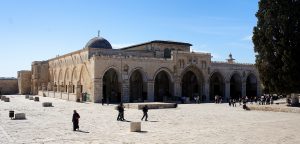She is the first woman to be banished by the Israeli occupation from Masjid al-Aqsa and the Old City for a period of six months. On top of that, her name was also the first on the list of those banned from entering al-Aqsa. Yet, due to her distress and yearning of Al-Aqsa, she made a firm decision, that if the occupation decided to banish her from the Muslim’s first qibla, she will commit herself to “ribat”[1] at one of its gates. By doing that, she will be able to enjoy the honour of provoking the enemy by defending the dignity of the Ummah. She is Murabita[2] Hanadi Hilwani.
“Detention and banishment will never affect my passion for al-Aqsa”
Background
The thirty-seven-year-old Jerusalemites lives in Wadi al-Joz in al-Quds. She holds a bachelor’s degree in Social work from Al-Quds Open University. Besides, she also holds a degree in the Holy Quran from the Jordanian Awqaf and the Conservation of the Holy Quran Society in Jordan.
Al-Aqsa is her priority
Hanadi, who is a loving wife to her husband, is blessed with four children. Despite her deep love and care for her family, she regards Masjid Al-Aqsa as the first priority in her life. For her, defending the Masjid is worth all the sacrifices that she and her family have to make.
Hanadi’s journey with Al-Aqsa began very early; it is a process of permanent and close association between them. As a member of the Holy Quran Association, she has taught the Book of Allah in Masjid al-Aqsa since 2008. In 2010, she taught the Quran within the project of “Terrace of Knowledge”[3] in al-Aqsa, and since then, she has accredited dozens of students.
Detention and intimidation
When speaking about her experience of detention, Hanadi said: “I have been arrested more than 16 times. Of those arrests, I have slept three times in the prisons; the first time was in the prison of al-Moscobiye where I slept for a day and a night; the second and third ones was in Ramleh Prison where I was detained for six and seven days, respectively. I have been subjected to interrogation for many hours and, more often than not, my hands and legs were chained with iron. In addition, I also suffered being moved from one prison to another.
I have been intimidated since my first detainment. They threatened to deport me to Gaza or Turkey, to revoke my health and national insurance, and to void my ID.
During the interrogations and detention, I encountered lots of verbal abuses. There were also attempts to prevent me from wearing my hijab during my detainments in the Ramleh Prison. When I refused to uncover my head, I was punished by being put in solitary confinement. The cell where I was confined was stinking and not fit for human life at all. To add salts to my wound, they broke into my house, ruined its contents, and confiscated a lot of my devices and documents.”
Repeated Banishments
Hanadi have been sentenced with numerous banishments by the occupation: the first one was for two months; the second was for two weeks; the third was for three months. Then, she was sentenced with four other banishments with the range of one to three months each. The longest one, which was made two years ago, was for six months. That was the first time such a long banishment was issued against a woman of Al-Quds. That decision was later followed by another banishment the Old City for the same period.
As if all those banishments were not enough, in 2015, her name was ranked at the top of a list that bans certain people from entering al-Aqsa indefinitely. The Israeli occupation calls this list as the “blacklist” while the Palestinians named it as the “Golden List” since it has honored the names of al-Aqsa’s bravest defenders.
Hanadi has never given in to the ban. She decided to stand at the gates of al-Aqsa and camped at the nearest point that she could reach. She also published and distributed English brochures. To motivate the banished Murabitat, she made special clothes, most notably the scarf of the Golden List, for them.
Ribat and Yearning for Al-Aqsa
The Murabita from Al-Quds said, “I particularly chose the Chain Gate, which has become the great castle for the banished Murabita in confronting the enemy, because the settlers and tourists come out through it after breaking into Masjid al-Aqsa. By standing at the Chain Gate, I am delivering a message to the Israeli occupation that we are clinging to our land and Al-Aqsa. We will never give our rights up.”
It has caused a great grievance to the steadfast Murabita Hanadi that she can only look at al-Aqsa from far away without being able to make a single prayer in its courtyards. She wipes away her indescribable pain of yearning to pray and teach Al-Quran in Al-Aqsa. Nonetheless, she believes that injustice will never last. She also believes in the importance of resisting the oppressive Israeli decisions by the power of truth and righteousness.
[1] Staying at a place with the intention of defending it
[2] Murabitah (المرابطة) are the women who commit themselves to ribat
[3] Terrace of Knowledge or Masothib Al-Ilm (مصاطب العلم) is a platform inside the yards of Al-Aqsa used by students of knowledge


